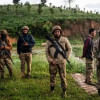UN's Bosnia promise forgotten in Myanmar

After the shame of Bosnia, there should not have been a Myanmar.
Yet, Myanmar happened because the big nations on both sides of the East-West divide have rendered the UN an ineffective organisation, a platform to talk and not to take actions.
When in July 1995, the Christian Serbs raided the Bosnian Muslim "safe zone" in Srebrenica and killed thousands of men and boys, the world remained a spectator with voices to speak but no will to act.
They were vocal even before when the Bosnian tragedy unfolded. The UN Security Council, between April 1992 and October 1993, adopted a record 47 resolutions and issued 42 statements. Yet two years later, the Srebrenica massacre was unleashed as the nations in the UN could not decide what actions to take to stop the atrocities thrust upon the Muslims.
Those nations who had their troops in Bosnia with Blue Helmets did not want any military offensive against the Serbs. Nations which did not commit any troops wanted military intervention. In the end, no action was taken and Srebrenica happened.
The events in the heart of Europe shook many a conscience. UN Secretary General Kofi Annan in a report concluded "the tragedy of Srebrenica will haunt our history forever".
And at the opening session of 1999 General Assembly, he showed his resolve when he said that national borders would no longer protect leaders who abuse people under their control.
Eight years down the line and six years after the butcher of Serbia Slobodan Milosevic was arrested by the Yugoslav authorities for genocide, the International Court of Justice issued an important judgement in the case of Bosnia and Herzegovina versus Serbia and Montenegro.
The court echoed what Kofi Annan had said and announced that the obligation to prevent genocide cannot be limited by territories.
It said every state with a "capacity to influence effectively the action of persons likely to commit, or already committing genocide", even if outside its own borders, was under an obligation "to employ all means reasonably available to them, so as to prevent genocide so far as possible".
The world thought there would not be another Bosnia. The world thought there would not be another Srebrenica. Myanmar was a rude awakening for the world.
And the world forgot their obligation as Kofi Annan and the International Court of Justice had lain out. None of the nations that had any power to stop the Myanmar genocide raised a finger.
The UN under Antonio Guterres, a socialist, a committed reformer, the former prime minister of Portugal, was expected to change the UN from its bureaucratic straps that made it a talking platform. He was after all the prime minister who resigned and went to the city slums to teach children math before being appointed the UN chief for the first time in the history through an open debate. He was a man to operate with "heart and reason".
But even he proved too helpless this time in Myanmar as all that the UN have done so far was to issue a Security Council statement and to hold an open discussion to be snubbed by vetoes by China and Russia after the greatest modern time exodus after the persecution began. Meantime, the streams of Rohingyas fleeing killings and rape continue.
This has exposed the inherent weakness of the UN system and the greater need for reforms to prevent and intervene in future genocides.
The call for restraining the veto power in cases of genocide has been growing louder in recent years. In 2013, France, one of the five permanent members in the Security Council, presented a proposal to the General Assembly to limit the use of the veto power in cases of genocides.
Two years after France's initiative, 107 countries jointly placed a proposal in the General Assembly for enacting a code of conduct to limit the exercise of the veto power. France and UK supported this move.
This reform should immediately be carried out to have a strong UN to deliver on its core goal-- prevention of genocide.
The genocide in Myanmar must be stopped forthwith and after Myanmar there must not be another one.

 For all latest news, follow The Daily Star's Google News channel.
For all latest news, follow The Daily Star's Google News channel. 








Comments